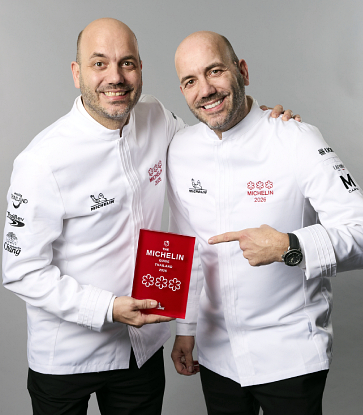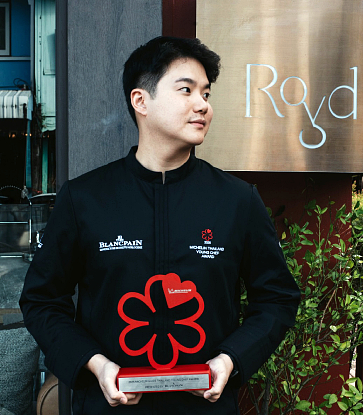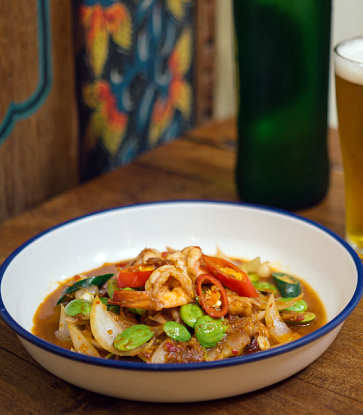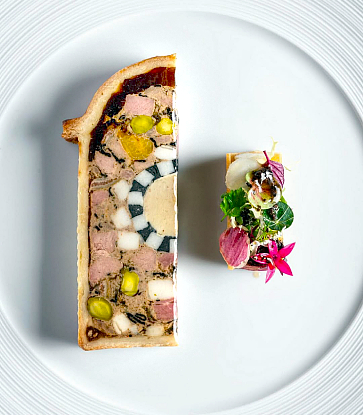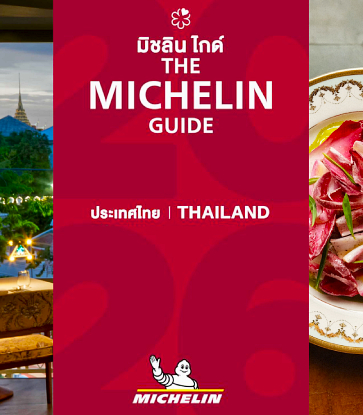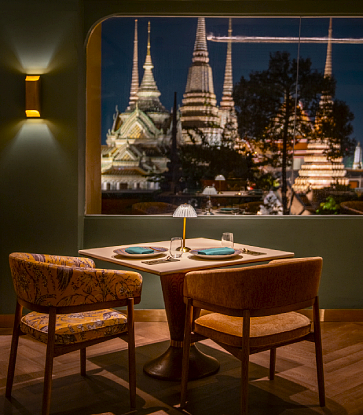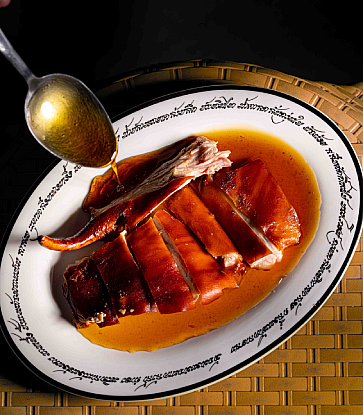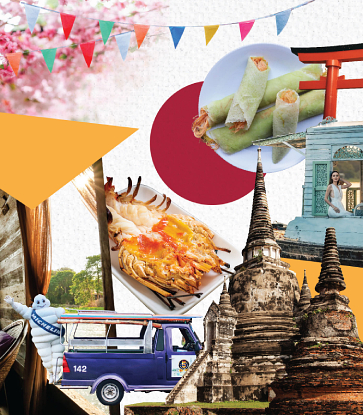“Whenever there’s a business crisis, you might think that the easiest and fastest fix is to close down. Just stop. It won’t hurt you that much. But as a business owner, that’s not an easy decision to make because you’re responsible for employees and other stakeholders. You have to think about the survival of others too, not just your own.”
These are the words of Fred Meyer, the Frenchman who fell in love with Thai food so much so that, after decades of living in Thailand, he is now an integral part of the Thai culinary world. Fred Meyer is a widely recognised name in Thai cuisine with his many restaurant projects such as Issaya Siamese Club (MICHELIN Plate) and Baan Phadthai (Bib Gourmand), with unique Thai menus in Bangkok; Kiti Panit (MICHELIN Plate), featuring Northern Thai cuisine in Chiang Mai; and ICI, serving desserts in Bangkok. He is known for affordable, accessible fine dining that is distinctively Thai.
A shining star among Fred Meyer’s endeavours is Saawaan, which began as an inspired labour of love, but achieved much acclaim including One MICHELIN Star. Not only that, his partner at the restaurant, Chef Sujira “Aom” Pongmorn, won the first MICHELIN Guide Young Chef Award in Thailand in 2021.
These accolades may be a true testament to the resilience of these restaurants during the COVID-19 crisis.

Urgent problems needed immediate attention
The COVID-19 pandemic has not only been a public health crisis, but it also has seriously impacted the economy, affecting lives across every level of society. And the restaurant industry is at the top of the list of those suffering severe losses as they endured limited operating hours and dining-in prohibitions mandated to reduce the risk of spreading the virus.
“It’s been a very difficult time for everyone. At one point, we had to face closing down, but still, we had to find a way to keep going.”
Meyer recounts how he handled the situation. In addition to prioritising employees, he knew he had to be flexible and courageous in his decision-making. “Do what should be done. Do what hasn't been done. Do what hasn't been tried.” One thing that he did do was adjust the menu for delivery, which is not easy for a fine dining restaurant. As for other things he did, Meyer is keeping those to himself for now. But it is safe to say that COVID-19 presented a challenging time of trial and error.
For Meyer, the biggest challenge as a restaurant operator was regarding employees. Even if they could return to normal service, the situation would be anything but normal. First, customer numbers would likely be extremely low. Second, staff may feel a lot of stress and be unable to put their hearts into their work as before. Third, even as restaurants complied with regulations, assistance was often hard to come by or wasn’t as much as expected.
“Once you truly grasp and absorb Thainess, you’ll understand why ‘mai pen rai’ is a beautiful philosophy.”

Listening to every side
“The first thing was having discussions. I talked to everyone around me. Staff, friends, partners, suppliers, shareholders, and customers. There was a lot of talking and listening, sharing problems and situations. We saw that we understood many things the same way and, more importantly, we understood each other.”
The Frenchman had many things to consider when coming up with how to survive through this crisis and reopen. Considering all the restaurants that were forced to close and the Kasikorn Research Centre reporting how the restaurant industry is facing greater risks and challenges, fine dining establishments would have the biggest issues. Meant to be an in-restaurant experience and not really suitable for delivery or take-out for eating at home, fine dining would be impacted more by the current crisis than other restaurant categories.

Creative thinking and actions
Faced with countless problems, this optimistic Frenchman looked on the bright side. In this crisis, he saw the opportunity to get creative, thinking up things to try that he may never have before.
He admits that sometimes he didn’t come up with the best solutions. But it was still better than not doing anything, especially since most of Meyer’s restaurants are Thai fine dining. This complicated matters because as the situation resolves, fine dining establishments serving foreign cuisine such as French, Chinese, Japanese, Korean, or Italian should see customers quickly. But this is not necessarily the case with Thai cuisine as they tend to be patronised mainly by foreign visitors.
“Most Thais will pay for foreign food. It’s a way to make up for not being able to travel, to experience a region through its food.”
Nevertheless, Meyer admits he was lucky to be surrounded by tremendous support, especially from employees who happily pitched in, and, of course, from his wife who has always stood by him, encouraging him along. This strengthened his resolve and inspired him to undertake new projects, such as one at Issaya Siamese Club. Here, the restaurant’s chefs collaborated with Japanese, Mexican, French, and Italian chefs to create a fusion menu for delivery. Completed in just two months, this unique offering was very well received, better than expected.
Once it was established that there were no plans to cut staff, there was a confidence and trust that inspired a sense of community, with everyone helping out wherever they could. Fred laughed as he explained how visitors might have seen the head chef waiting on tables while wait staff headed out to deliver food to customers at home.
“We did everything we could. Here’s the thing -- COVID-19 forced us to think more creatively. It inspired us. Made us look at every little detail. Improve the quality of our service. And that is the most important factor, quality. No matter what happens, we’ll never compromise our quality.”
“You must focus on your responsibility to your staff during a crisis, not just think about operations. People are vital to business.”
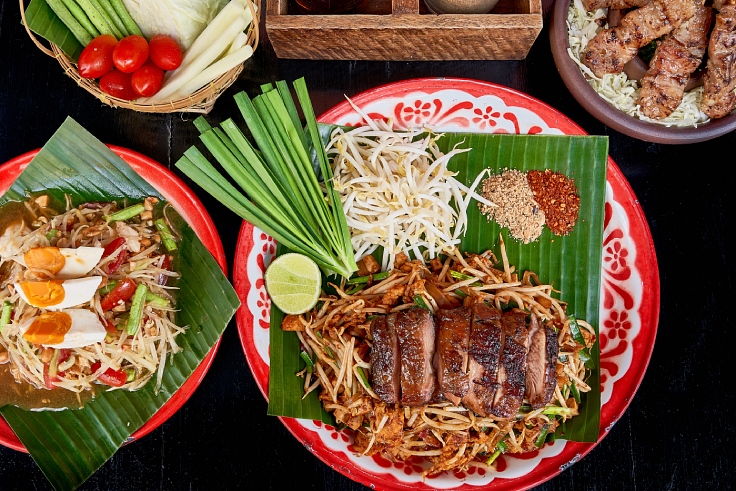
Seeing the world through mai pen rai
The Frenchman explains how, although this may not be talked about much, he feels fortunate to have faced this crisis in Thailand. At least the situation here was not as bad as in other countries. And the Thai people’s heartwarming goodwill expressed in their willingness to lend a helping hand and not compete, combined with the optimistic Thai mai pen rai, or “no worries”, attitude, gave Meyer the strength to persevere and fight.
“At first, foreigners may find the mai pen rai aspect of Thai culture frustrating. But once you truly grasp and absorb Thainess, you’ll understand why mai pen rai is a beautiful philosophy. Okay, you know what the problem is. It’s okay. Take your time to solve it. Do what you can.”
This mai pen rai attitude helped Meyer find the positives in this crisis. Limited opening hours? No worries. At least they could open at all. Fewer customers? Never mind. Now there’s more time to spend with the customers who are there.

People are a restaurant’s heart and soul
When asked if he had any advice to offer to other restaurateurs, he offers what he says is not a suggestion. He states that although every establishment may have its own unique operations, anyone considering opening or investing in a restaurant must understand that this is a labour intensive business, relying heavily on people. He explains how, to earn the same revenue, an importer may only require four employees to achieve this amount, while a restaurant would need 25 employees.
So, he clearly emphasises that no matter what plans, actions or changes you make, you must always keep your employees at the top of your mind and give them their due attention, especially during a crisis.
“You must focus on your responsibility to your staff during a crisis, not just think about operations. People are vital to business. In these difficult times, what surprised me was how impressively my people performed, like I’ve never seen before. As well as fostering understanding, they all shone in their own way.”
One MICHELIN Starred restaurants such as Saawaan have received Amazing Thailand Safety & Health Administration (SHA) certification. This programme is a joint project involving the Tourism Authority of Thailand (TAT), Ministry of Tourism and Sport, with the Department of Disease Control, Department of Health, Department of Health Service Support, Ministry of Public Health, and others. SHA certification verifies the safety, hygiene, and sanitation quality of products and services of Thai businesses. This is a joint effort to promote travel in Thailand while helping to reduce the risk and to prevent the spread of COVID-19 as well as raising the standards of Thai tourism products and services.
For more information about about the SHA project, please visit thailandsha.tourismthailand.org




